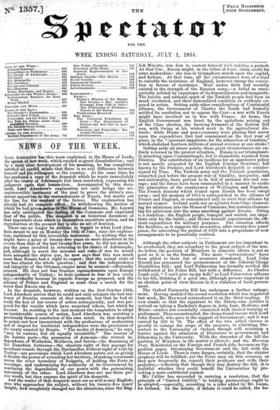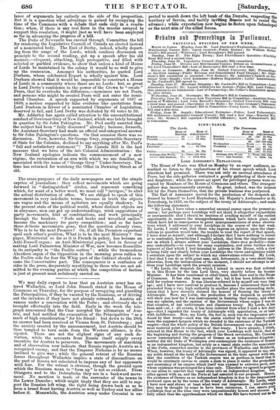NEWS OF THE WEEK.
Loan ABERDEEN has this week explained, in the House of Lords, the speech of last week, which created so great dissatisfaction ; and by a more clear development of his meaning, he has completely satisfied all candid minds that there is no real difference between himself and his colleagues or the country. At the same time, he has produced a copy of the despatch which he wrote immediately after the treaty of Adrianople had been concluded, expressing his judgment upon that transaction. Accompanied by this docu- medt, laird Aberdeen's explanation not only brings the un- eontrovertible testimony of the past to prove the writer's con- sistent opposition to the encroachments of Russia, but marks out the line for the conduct of the future. The explanation has already had, its complete effect. In withdrawing the motion of ivhieh he had given notice in the House of Commons, Mr. Layard has only anticipated the feeling of the Commons and expressed that of the public. The despatch is an historical document of that important class which in themselves constitute action, and its reproduction at the present day is also an act of decision. There can no longer be mistake in regard to what Lord Aber- deen meant to say on Monday the 19th of June, since his explana- tion, sustained by this irresistible testimony. In wishing that we might have a peace of twenty-five years no more disastrous in its events than that of the last twenty-five years, he did not mean to pay the price involved in returning to the treaty of Adrianople; and, although to avert the miseries and risks of war he would have accepted the status quo, he now says that this was much more than Russia had a right to expect ; that the actual state of war has altered the whole question ; and that the independence and integrity of the Ottoman empire must be secured—effectually secured. He does not fear Russian encroachments upon Europe independently of Turkey ; he feels inclined to fear it less every day,—evidently because he regards Europe as prepared, and the alliance of Fiance and England as more than a match for the worst that Russia can do.
In the despatch, however, written on the 31st October 1829, Lord Aberdeen proves that he could not only estimate the bad ten- dency of Russian counsels at that moment, but that he had al- ready the key of her course of action subsequently, and was pre- pared for the results which have surprised others,' but which he foresaw. In resisting to the last moment the temptation to adopt an irretrievable course of action Lord Aberdeen was resisting a previously formed conclusion of his own mind. In that despatch he points out how inconsistent with the professions of moderation and of respect for territorial independence were the provisions of the treaty exacted by Russia. "The modes of dominion," he says, "may be various, but all equally irresistible." The cession of the Asiatic ports—the possession of Armenia—the virtual in- dependence of Wallachia, Moldavia, and Servia—the disarming of the Danubian fortresses—the absolute right of free passage for merchant-vessels through the Dardanelles without right of visit by Turkey—are provisions which Lord Aberdeen points out as giving to Russia the power of extending her territory, of making incursions across the river boundary of Bulgaria, of holding the Porte in vassalage, and undermining the authority of its Government by combining the degradation of one power with the patronizing suzerainty .of the other. Lord Aberdeen does not use these pre- cise words, but they express the spirit of his despatch.
And the reader of that despatch must see as well as any English- man who approaches the subject, without his twenty-five years' insight, how completely changed are the situations, since the Eng-
lish Ministei was fain to content himself with inditing a protest. At that t;m,... Russia might, in the letter at least, claim credit for some moderation : she was in triumphant march upon the capital, and forbore. At that time, all the circumstances were of a kind to enfeeble the resistance of England, however strong the convic- tion in favour of resistance. Most undue faith had recently existed in the strength of the Russian army,—a belief as unex- pectedly refuted by experience of its demoralization and incapacity. The loyalt3 and national spirit of the Turkish people had been as much overrated, and their demoralized condition as suddenly ex- posed in action. Setting aside other considerations of Continental alliance, the Government of Charles the Tenth had formally notified its resolution not to oppose the Czar—a war with Russia might have involved us in war with France. At home, the Bnglish Government was beset by the agitations arising out of the Clare election, the brewing ferments of the Reform Bill sera, with Swing at his wicked work in the agricultural dis- tricts; while Hume and peace-economy were placing that screw upon the expenditure that had commenced on the first year of peace, in the "ignorant impatience for the relaxation of taxation," which abolished fourteen millions of annual revenue at one stroke !
Setting aside all minor points, those great circumstances are en- tirely reversed in the present situation. Russia is not triumphant- ly marching-upon Constantinople, but is shamefully repulsed from Silistria. The substitution of an insidious for an aggressive policy is not merely suspected by the English Foreign Secretary, but known by the Premier, and Lord Aberdeen's despatch is counter- signed by Time. The Turkish army and the Turkish population, suspected just before the present war of timidity, incapacity, mid non-nationality, have proved to be full of national fire and cou- rage; and the forces have been commanded in a manner to excite the admiration of the countrymen of Wellington and Napoleon. The French dynasty which leaned upon Russia has been swept away ; and the memory of 1815 is extinguished in the alliance of France and England, or remembered only to rivet that alliance by mutual respect. Ireland sends not an agitator from Clare clamour- ing for admission into the House of Commons, but recruits clamour- ing for admission into the army marching against Russia. Swing is a tradition ; the English people, tranquil and united, are impa- tient only for the battle ; and Hume himself superintends the cient expenditure for military purposes. The situation affords the facilities, as it suggests the necessities, after twenty-five years' pause, for converting the protest of 1829 into a programme of new arrangements to be practically realized.
Although the other subjects in Parliament are too important to be overlooked, they are secondary to the great subject of the war. As before, the position of Ministers in domestic affairs is not so good as it is on the Danube. Two more " retractations" have been added to their list of measures abandoned. Lord John Russell has announced the postponement of the Colonial Clergy Disabilities Bill ; and Lord Palmerston has formally notified the withdrawal of his Police Bill, but with a difference. As Charles Lamb said, " I can't give up my hell," so Lord Palmerston adheres to his bill, thinking it a good one, although persons important in an election point of view discern in it a violation of local govern- ment.
The Oxford University Bill has undergone a further enlarge- ment. Having modified the second resolution which was negatived last week, Mr. Heywood reintroduced it on the third reading. It now stands so that the signature to the Thirty-nine Articles is waived on taking a Bachelor's degree in Arts, Law, Medicine, and Music—studies not essentially connected with clerical training or preferment. Thus reconstructed, the clause found favour with Lord • John Russell, who gave it the support of Government; and it was carried by 233 to 79. The effect of the two added clauses is greatly to enlarge the soope of the measure, in admitting Dis- senters to the University of Oxford, though still retaining a barrier against the admission of Dissenters to government and fellowship in the University. With the character of the bill the position of Ministers in the matter is altered ; and the Morning Post, Ministerial on the Foreign and French side, becomes an Op- position paper, threatening Government and the bill with the House of Lords. There is some danger, certainly, that the sinister prophecy will be fulfilled; yet the Peers may on this occasion, as they now frequently do, consult their prudence and stifle their prejudice,—reflecting that though they may destroy the bill, it is doubtful whether they could benefit the Universities by pro- voking a more embittered contest. Mr. Collier has succeeded in carrying a resolution, that the principle of "limited liability" in trading partnerships ought to be adopted,—especially, according to a rider added by Mr. Lucas, for Ireland. In the debate, if debate it could be called, the bar
lance of arguments lay entirely on the side of the proposition. But it is a question what advantage is gained by occupying the time of the Commons with a debate that ends only in a resolu- tion ; when, if there is any real force in the muster arrayed to support this resolution, it might just as well have been employed so far in advancing them ss of a bill.
The Duke of Newcastle °17aes carried through Committee the bill for rendering the Legislative Council of Canada an elected instead of a nominated body. The Earl of Derby, indeed, wholly depart- ing from the usage of the Lords, which confines discussion on principle to the second reading, got up a speech after his old manner,-eloquent, attacking, high prerogative, and filled with selected or garbled evidence, to show that unless a kind of House of Lords be maintained in the colony it would be as well to give up the connexion. Amongst his authorities, he quoted Lord Durham, whose celebrated Report is wholly against him. Lord Durham showed that it would be impossible to construct a House of Lords in a community where there are no Lords : but, so great is Lord Derby's confidence in the power of the Crown to " oreate " Peers, that he overlooks the difference,-nominees are not Peers, and persons who might be created Peers will not enter the nomi- nated Chamber. A speech supported by arguments of 1837 or 1839, a motion supported by false evidence like quotations from Lord Durham in favour of a nominated Chamber of Legislation, deserved to fail, and Lord Derby was defeated by 63 votes to 39.
Mr. Adderley has again called attention to the unconstitutional conduct of Governor Grey of New Zealand, which was lately brought in question by Sir John Pakington. Mr. Peel coolly asserted that the subject had been "fully discussed" already ; because, forsooth, the Assistant-Secretary had made an official and categorical answer to Sir John Pakington's questions. On that occasion there was no discussion. Now, however, Sir George Grey, responsible Secretary of State for the Colonies, declined to say anything after Mr. Peel's "full and satisfactory statement"! The Canada Bill is the last measure that we have of the late Colonial Administration : the New Zealand apologies indicate the commencement of a new regime, the restoration of an tera with which we are familiar, as associated with the name of "George Grey" Under-Secretary. The time has returned for watching the Office in Downing Street as of old.



































 Previous page
Previous page